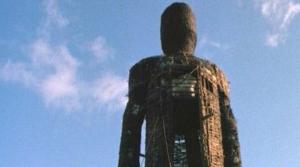
The Wicker Man (Robin Hardy, 1973)
The Wicker Man has been acknowledged by some as the greatest British horror film of all time. Although such accolade might be arguable, there is no doubt that Robin Hardy's first feature film and adaptation of Anthony Shaffer's novel of the same title has garnered quite a cult following since its release, to the point of being remade by director Neil LaBute. The film has accomplished quite a feat as there is no visceral manifestation of horror in the film. There are no ghosts, ghouls, or demons. But as they say, the best horror films are actually those that play with your mind and leads you to believe or actually feel a lingering danger. That is actually what The Wicker Man is most successful in. It sucks you in a seemingly normal police procedural and then keeps you paranoid as to what may and can happen.
Sergeant Howie (Edward Woodward) arrives by aeroplane to Summerisle to investigate a supposedly missing child. At first, the citizens of the island refuse to acknowledge that such child exists but upon further investigation, Sergeant Howie discovers that the island has rejected Christianity in favor of ancient paganism and somehow, the entire case of the missing child seems to be connected to the upcoming May Day Festival the Lord Summerisle (Christopher Lee) and the island's citizens are preparing for. A devout Christian, Sergeant Howie makes it both an official and personal mission to find the missing girl and see that everything is put in their proper place.
Like most horror films, the general attack is claustrophobia but here, director Robin Hardy does not make use of narrow hallways or prison-like spaces. He uniquely achieves the desired claustrophobic feel even with the island's beautiful greens and clear skies and generally cordial villagers. It is achieved by placing a single individual within a wall of potentially obnoxious and jarring principles. The sergeant is a highly principled personality and when surrounded by a culture that derives existence from potentially damaging beliefs of pagan gods and rituals, sexual rites and forms of merrymaking, deviant education, he is left uncomfortable and inevitably defensive. It's brilliant filmmaking. During the sergeant's first night, he is bothered by the innkeeper's daughter knocking on his walls and inviting him to join in. It is clear that he is tempted, but when the director couples the scene of temptation with a lush song and seductive if not cinematically off-placed dancing, it is almost ludicrous that the sergeant does not succumb. The point here is that the sergeant is obviously out-of-place in the island and whatever images he might find offensive and weird to his outsider sensibilities, is actually quite normal. In Summerisle, he is the invader, the outsider, and everything that is in accord to his beliefs and principles is strange and unwanted in the community.
The plot further transforms from discomforting discovery in the first forty minutes, into an actual pagan orgy that leads to the film's twist. It's elegantly told. Hardy's visuals is quite clear-cut. Pagan rituals are depicted with an unnatural and almost magical quality while other scenes are mundane and straightforward. You can actually distinguish whether the scenes are real or not, based on the visual's dreamlike composition, but when the plot leads you to discover that there is actually no difference, and that the dream is actually taking place in the film's reality, its very disturbing and quite horrifying. Obviously, we take the stance of the unfortunate sergeant who finds himself a stranger in a time and age wherein he should supposedly feel in place and his beliefs are natural and common place. We are also turned off and shocked by the existence of pagan barbarism in an age of supposed civility and modern religion. It is that effective suggestion, and that arousal of suspicion, that makes The Wicker Man a fantastic horror film, even to this day.
0 comments:
Post a Comment